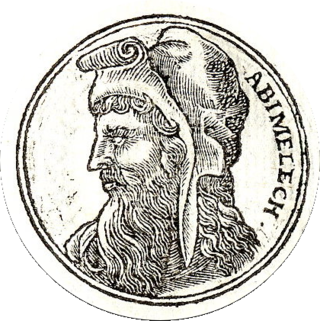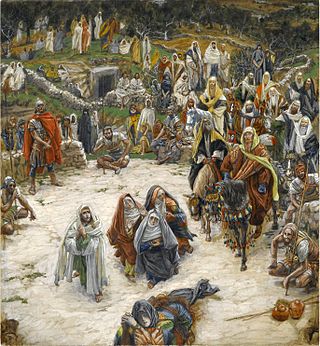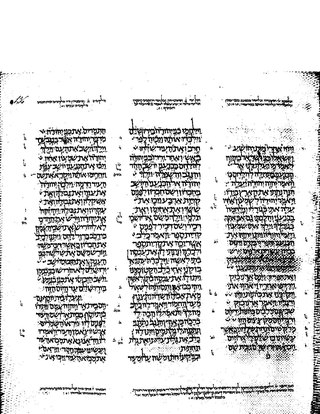
Abimelech was the generic name given to all Philistine kings in the Hebrew Bible from the time of Abraham through King David. In the Book of Judges, Abimelech, son of Gideon, of the Tribe of Manasseh, is proclaimed king of Shechem after the death of his father.

Gideon also named Jerubbaal and Jerubbesheth, was a military leader, judge and prophet whose calling and victory over the Midianites are recounted in Judges 6–8 of the Book of Judges in both the Hebrew Bible and the Christian Bible.

Samson and Delilah, Op. 47, is a grand opera in three acts and four scenes by Camille Saint-Saëns to a French libretto by Ferdinand Lemaire. It was first performed in Weimar at the Grossherzogliches Theater on 2 December 1877 in a German translation.

Sarah is a biblical matriarch, prophet, and major figure in Abrahamic religions. While different Abrahamic faiths portray her differently, Judaism, Christianity, and Islam all depict her character similarly, as that of a pious woman, renowned for her hospitality and beauty, the wife and half-sister of Abraham, and the mother of Isaac. Sarah has her feast day on 1 September in the Catholic Church, 19 August in the Coptic Orthodox Church, 20 January in the LCMS, and 12 and 20 December in the Eastern Orthodox Church.

Shechem, also spelled Sichem was an ancient city in the southern Levant. Mentioned as a Canaanite city in the Amarna Letters, it later appears in the Hebrew Bible as the first capital of the Kingdom of Israel following the split of the United Monarchy. According to Joshua 21:20–21, it was located in the tribal territorial allotment of the tribe of Ephraim. Shechem declined after the fall of the northern Kingdom of Israel. The city later regained its importance as a prominent Samaritan center during the Hellenistic period.

Abimelech or Abimelek was the king of Shechem and the tribal territory of Manasseh, and a son of biblical judge Gideon. His name can best be interpreted as "my father is king", claiming the inherited right to rule. He is introduced in Judges 8:31 as the son of Gideon and his Shechemite concubine, and the biblical account of his reign is described in chapter nine of the Book of Judges. According to the Bible, he was an unprincipled and ambitious ruler who often engaged in war against his own subjects.

The sayings of Jesus on the cross are seven expressions biblically attributed to Jesus during his crucifixion. Traditionally, the brief sayings have been called "words".
The judges whose stories are recounted in the Hebrew Bible, primarily in the Book of Judges, were individuals who served as military leaders of the tribes of Israel in times of crisis, in the period before the monarchy was established.

Gaal (Hebrew:גַּעַל) was a minor 12th century BCE biblical character, introduced in the 9th chapter of Judges in the Hebrew Bible as the son of Ebed or Eved, or the son of a slave. His story is told in Judges 9:26–41.

The article deals with the biblical and historical kings of the Land of Israel - Abimelech of Sichem, the three kings of the United Kingdom of Israel and those of its successor states, Israel and Judah, followed in the Second Temple period, part of classical antiquity, by the kingdoms ruled by the Hasmonean and Herodian dynasties.
Sheerah is a woman in the Hebrew Bible who appears only in 1 Chronicles 7:24, where it says that she built three cities: Lower and Upper Beth-horon, and Uzzen-sheerah. According to 2 Chronicles 8:5, Upper and Lower Beth-horon were rebuilt by Solomon as fortified cities.

Judges 9 is the ninth chapter of the Book of Judges in the Old Testament or the Hebrew Bible. According to Jewish tradition the book was attributed to the prophet Samuel, but modern scholars view it as part of the Deuteronomistic History, which spans the books of Deuteronomy to 2 Kings, attributed to nationalistic and devotedly Yahwistic writers during the time of the reformer Judean king Josiah in 7th century BCE. This chapter records the activities of judge Gideon's son, Abimelech, belonging to a section comprising Judges 6 to 9 and a bigger section of Judges 6:1 to 16:31.










